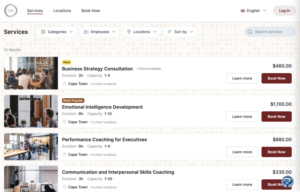Are you passionate about helping others achieve their goals and unlock their full potential? If so, becoming a coach might be your calling. But, that’s easier said than done. The real question here is how to start a coaching business and be successful.
Embracing coaching as a career isn’t just about achieving personal fulfillment; it’s an opportunity to create a profound and positive impact on the lives of those you work with. It’s a chance to combine your passions with your profession, and in doing so, transform your own life while helping others flourish.
In this comprehensive guide, we will accompany you every step of the way in your pursuit of starting a successful coaching business. Together, we will navigate the entire process, from establishing your niche and defining your coaching style to attracting clients and building a thriving practice.
Let’s dive in and learn how to start a coaching business and make a meaningful difference in the world!
Jump to
- What Is Coaching?
- Types of Coaches
- How to Start a Coaching Business in 15 Steps
- The Secret of Becoming a Successful Coach
- Avoid These Four Common Mistakes When Starting Your Coaching Business
What is Coaching?
Before we dive into the nitty-gritty of how to start your coaching business, let’s begin with a clear understanding of what coaching is all about. At its core, coaching is a supportive and collaborative process where a trained professional (the coach) helps individuals or groups (the clients) achieve their personal or professional goals. This involves providing guidance, feedback, and support to facilitate personal and/or professional growth and development.
Types of Coaches
Coaching is a diverse field, and there are various niches you can specialize in, depending on your interests and expertise. Here’s a brief look at some of the common types of coaches:
- Life Coach: A life coach helps clients improve various aspects of their lives, including personal relationships, health, and overall well-being.
- Business Coach: Business coaches work with entrepreneurs and professionals to enhance their skills, grow their businesses, and navigate challenges in the corporate world.
- Career Coach: These coaches assist individuals in making career decisions, finding the right job, or advancing in their current professions.
- Health and Wellness Coach: Focusing on physical and mental health, these coaches help clients lead healthier lifestyles and achieve fitness goals.
- Executive Coach: Targeting leaders and executives, executive coaches provide guidance on leadership, decision-making, and professional growth.
For a more detailed overview of various coaching niches, read our in-depth guide on different types of coaching.
How to Start a Coaching Business in 15 Steps

Image by pch.vector on Freepik
- Step #1: Hone your coaching skills
- Step #2: Pick the right coaching niche for you
- Step #3: Do your market research and find your ideal client
- Step #4: Define your coaching model
- Step #5: Create a solution your clients can’t resist
- Step #6: Write a coaching business plan
- Step #7: Determine your coaching business structure
- Step #8: Set up a bank account
- Step #9: Get the necessary business licenses and certificates
- Step #10: Think about the initial and ongoing expenses
- Step #11: Price your coaching services
- Step #12: Create a marketing strategy
- Step #13: Take your coaching business online
- Step #14: Start selling your services
- Step #15: Grow your coaching business
Step #1: Hone your coaching skills
To become a successful coach, you need to develop essential skills such as communication, active listening, empathy, emotional intelligence, and the ability to set and motivate clients toward their goals. These skills are the foundation of effective coaching.
Communication skills
Effective communication is at the heart of coaching. If you want to learn how to start a coaching business, you first need to master the art of clear and purposeful communication. This means being clear in your words and mindful of body language, tone, and language when interacting with clients. Your ability to express ideas, ask questions, and give feedback that’s easy to understand is crucial.
Additionally, as a coach, be an active and empathetic listener. This means truly understanding your clients’ thoughts and feelings, not just hearing them. Create an environment where clients feel valued and heard. Active listening helps you grasp the nuances of your client’s situation, uncover their concerns, and ask the right follow-up questions.
Empathy and emotional intelligence
Empathy in coaching is about understanding and sharing your client’s feelings. It’s like stepping into their shoes, recognizing how they feel, and responding with kindness. You create a safe place for your clients to share their thoughts and feelings without fear of judgment.
Emotional intelligence goes a step further. It’s about recognizing, managing, and responding to both your own and your client’s emotions. This helps you build trust, guide your clients effectively, and help them grow. It’s like reading emotional signals and using them to help your clients better.
The ability to set and motivate clients toward their goals
Helping clients set and work toward their goals is a key part of becoming a coach. You begin by helping them define what they want to achieve, whether in their personal or professional life. You do this by asking questions and having conversations with them.
Motivation is like the engine that drives coaching. As a coach, you’re responsible for keeping your clients inspired and accountable. This means understanding how to motivate different people and helping them stay motivated even when they face challenges.
These skills are the building blocks of good coaching. When you can talk effectively, listen with understanding, and motivate your clients, you create a supportive environment where they can grow and make the changes they want in their lives. Master these skills, and you’ll be on your way to building a successful coaching business.
Step #2: Pick the right coaching niche for you
If you’re wondering how to start a coaching business and be successful, selecting the right coaching niche is a critical decision you need to make. This is the area in which you specialize and focus your coaching efforts.
Your choice should align with your passions, interests, and expertise. When you’re genuinely passionate about the area you’re coaching in, it doesn’t feel like work; it feels like a fulfilling journey. Your enthusiasm will naturally shine through, making your coaching more engaging and motivating for your clients.
Specializing in an area where you have expertise gives you an edge. It enables you to draw upon your background, education, and real-world experience to provide valuable insights and guidance to your clients. Your authority in your niche builds trust with your clientele.
Identifying your coaching niche
To pinpoint your ideal niche, consider the following steps:
- Self-Reflection: Assess your personal interests and passions. What topics or areas ignite your enthusiasm? What issues or problems do you genuinely care about?
- Skills and Expertise: Reflect on your professional background, qualifications, and experiences. What knowledge and expertise can you leverage in your coaching practice?
- Market Research: Research the demand for coaching services in various niches. Are there specific areas where people are seeking coaching assistance? Is there a gap in the market that you can fill?
- Client Profiles: Create profiles of your ideal clients within different niches. Consider their demographics, needs, and goals. Which group resonates most with your skills and interests?
- Alignment: Ultimately, choose a niche where your passion, expertise, and the market’s demand align most effectively. This sweet spot will be the niche that you can excel in and be truly excited about.
Standing out in your niche
How to start a coaching business that stands out in a crowded coaching landscape? Choose a niche. When you’re a specialist, you differentiate yourself from generalists and demonstrate to potential clients that you’re the right person to address their specific challenges.
First off, a niche allows you to fine-tune your marketing efforts. You can create content, messaging, and marketing materials that directly address the pain points and aspirations of your target audience, increasing the likelihood of attracting the right clients.
Moreover, clients seeking a coach are often searching for someone with expertise in their particular area of need. By positioning yourself as an expert in your chosen niche, you’re more likely to draw in clients looking for your specific solutions.
Finally, specialization can lead to higher client satisfaction and better results. Clients are more likely to stick with a coach who understands their unique challenges and can provide tailored strategies for improvement.
Step #3: Do your market research and find your ideal client

Image by pikisuperstar on Freepik
Understanding your target audience is crucial when starting a coaching business. Conduct market research to identify your ideal clients’ needs, challenges, and preferences.
Market research helps you adopt a client-centric approach, which means your coaching services are tailored to the needs, preferences, and challenges of your ideal clients. What’s more, research equips you with valuable data and insights that can guide your decisions, from your coaching style and service offerings to your pricing and marketing strategies.
Understanding your market allows you to identify your unique selling propositions and stand out in a competitive coaching landscape. Tailoring your services to your ideal clients results in increasing the likelihood of attracting clients who resonate with your approach and are more likely to engage with your services.
Conducting market research
Begin by creating detailed profiles of your ideal clients. Consider demographics (age, gender, location), psychographics (beliefs, values, goals), and their specific needs and challenges. Then research other coaches in your niche to understand their strengths, weaknesses, pricing, and the strategies they employ to attract clients.
To understand your target audience, you can create surveys or questionnaires to gather information directly from your potential clients. This can provide valuable insights into their needs and preferences. Also, utilize online tools and analytics to track online behaviors, preferences, and the platforms they frequent. Participate in online communities and forums where your potential clients might discuss their challenges. If possible, engage in one-on-one interviews with individuals who fit your ideal client profile. This can offer a more personalized and in-depth understanding.
Step #4: Define your coaching model
When thinking about how to start a coaching business, this should be one of the first things to tackle. Your coaching model is the roadmap that guides your coaching practice. It’s a structured approach that defines how you’ll work with your clients, the methodologies you’ll use, and the tools and techniques that will help your clients reach their goals.
Having a well-defined coaching model ensures that your approach is consistent, no matter who your client is or what their specific needs may be. This consistency is essential for building your reputation as a reliable and effective coach.
In addition, a clear coaching model helps both you and your clients understand what to expect from each coaching session. It outlines the process, objectives, and steps involved in your coaching journey.
Finally, your coaching model streamlines the coaching process. It helps you manage your time effectively, address your client’s needs, and provide a focused and structured coaching experience.
Developing your coaching model
To create your coaching model, start with choosing coaching methodologies that align with your niche and your coaching philosophy. Whether you lean towards solution-focused coaching, transformational coaching, or another approach, ensure it resonates with your ideal clients.
You should also define the structure of your coaching sessions, including the duration, frequency, and format (in-person, virtual, or a mix, group sessions, or one-on-ones, etc.). A consistent session structure helps you manage your time and ensures that clients know what to expect.
Next, you need to identify the tools and techniques you’ll use to guide your clients towards their goals. This could include assessments, goal-setting frameworks, journaling exercises, and other resources that align with your coaching niche. Also, outline how you will assess your client’s progress and provide feedback. Regular assessments help track the client’s development, while constructive feedback guides them on their journey. Don’t forget to define how you will assign homework or tasks between sessions to reinforce the coaching process. Accountability is key to helping clients stay on track and committed to their goals.
Step #5: Create a solution your clients can’t resist
Effective coaching is all about the client. Your coaching solution must speak directly to their needs, challenges, and aspirations. It should communicate that you understand their unique situation and can help them navigate it.
There are many coaches out there, each with their own way of doing things. But in order to become a coach who gets clients, you need to make it clear what makes your coaching special. Highlight your strengths, methods, and why it’s great to work with you.
Clients are more likely to choose you when they understand what you offer. A strong message helps clients see why you’re the right coach for them.
Creating a solution that resonates
Here’s how to create a coaching solution that clients can’t resist:
Stand out with your unique selling point (USP)
Find what makes your coaching one-of-a-kind and super valuable. It could be your way of doing things, your experiences, or the fantastic results you get with clients. This is what makes you different from other coaches.
Create a clear message:
Make a simple and direct message that sums up what your coaching is all about. This message should talk about the issues and dreams of the clients you want to help, showing that you’re the answer they’re looking for.
Match your ideal client:
Make sure your coaching is a perfect match for the people you want to help. Show how your services can help them solve problems, reach their goals, and have a happier life.
Talk to your ideal client:
Use your clear message and unique selling point in your ads and materials. Write things that matter to your ideal clients. Whether it’s on your website, social media, or in your outreach, make sure they see the value you bring.
Step #6: Write a coaching business plan

Image by storyset on Freepik
Your business plan should encompass crucial elements like choosing a name, establishing a mission statement, setting business goals, and addressing legal and operational requirements. If you’re thinking about how to start a coaching business, it’s a great idea to start working on your plan as soon as possible.
Why?
Your business plan is like a roadmap for your coaching business. It helps you set clear goals and figure out where your coaching business is heading. In addition, your plan helps you make decisions, manage your resources, and stay organized. Moreover, if you need money for your coaching business, a good plan can convince investors or lenders to support you.
Elements of a coaching business plan
There are plenty of elements a sound coaching business plan should include, and here are some of them:
- Choosing a Name: Selecting a name for your coaching business is more than just a label; it’s your brand identity. The name should reflect your coaching niche and resonate with your target audience.
- Mission Statement: Your mission statement defines the core purpose and values of your coaching business. It succinctly conveys why your business exists and what it aims to achieve.
- Vision: The vision section outlines your long-term goals and aspirations. What is the future you envision for your coaching practice? This section provides a sense of direction and purpose.
- Business Goals: Set specific, measurable, attainable, relevant, and time-bound (SMART) goals for your coaching business. Goals might include the number of clients you want to serve, revenue targets, or expansion plans.
- Legal and Operational Requirements: Detail the legal and operational aspects of your coaching business. This may include any licenses, permits, or certifications required in your location. Address regulatory and compliance considerations.
Step #7: Determine your coaching business structure
Your choice of business structure significantly impacts your coaching business in terms of legal responsibilities, taxation, personal liability, and operational flexibility. Before you start your coaching business, decide whether you want to operate as a sole proprietor, LLC, or another business entity.
Different business structures offer varying levels of personal liability. By choosing the right structure, you can protect your personal assets in case of business debts or legal issues.
Also, each business structure has its own tax implications. Your choice affects how you report income, expenses, and tax deductions, which can have a significant impact on your bottom line.
Ultimately, your business structure determines your flexibility in making management decisions, raising capital, and operating your coaching business.
Types of business structures
When considering a business structure for your coaching practice, you have several options, including:
Sole Proprietorship
This is the simplest and most common business structure for solo coaching practices. It offers ease of setup and full control of your business. However, you are personally liable for business debts and legal issues.
Limited Liability Company (LLC)
An LLC provides a degree of personal liability protection while offering the flexibility of a sole proprietorship. It’s a popular choice for many coaching businesses.
Partnership
If you plan to have a business partner, a partnership structure may be appropriate. There are general partnerships and limited partnerships, each with its own legal implications.
Corporation
Corporations provide strong personal liability protection but involve more complex administrative and regulatory requirements. They are more suitable for larger coaching firms or businesses with multiple owners.
Nonprofit Organization
If your coaching practice has a charitable or educational focus, you might consider forming a nonprofit entity. This structure is subject to specific regulations and offers tax benefits.
Questions that can help you choose the right business structure for your coaching business
When selecting the right structure for your coaching business, consider the following factors:
- Liability Protection: How much protection do you need for your personal assets in the event of business-related issues or debts?
- Taxation: What are the tax implications of each structure, and which aligns best with your financial goals?
- Business Growth: Do you plan to expand your coaching practice or bring in partners? Some structures are better suited for growth and attracting investors.
- Operational Control: How much control do you want over your business decisions, and what reporting and regulatory requirements are acceptable to you?
- Cost and Complexity: Consider the setup costs and ongoing administrative requirements associated with each business structure.
- Legal Requirements: Be aware of the legal and regulatory requirements associated with the structure you choose in your jurisdiction.
Step #8: Set up a bank account
Separating your personal and business finances is essential. That’s why it’s one of the steps in our “how to start a coaching business” guide.
When you open a business bank account, it’s like giving your coaching business its own wallet.
Firstly, it helps you manage your finances more efficiently. Essentially, it keeps your personal money safe if your coaching business has money troubles or legal issues. Having separate accounts makes it clear what money is for your business and what’s for you. This makes it easier to keep track of your finances, do your taxes, and see how your coaching business is doing.
Also, it’s important for taxes. Having separate accounts makes it easier to report your coaching business’s money and expenses accurately. This helps you avoid tax problems.
How to set up a business bank account?
Once you decide to start your coaching business, you need to do your research and choose a reputable bank that offers business banking services. Look for a bank that offers features and account types that align with your coaching business’s needs.
Keep in mind that the bank will typically require specific documentation to open a business account. This might include your business formation documents, EIN (Employer Identification Number), personal identification, and proof of address.
To open your business account, you need to schedule an appointment with a bank representative. They can guide you through the process, explain account features, and help you complete the necessary paperwork.
Once your business account is set up, it’s crucial to manage your business finances carefully. Deposit all business income into this account and make all business-related expenditures from it.
Don’t forget to keep meticulous records of your business finances, including income and expenses. This record-keeping is essential for tax compliance, financial planning, and tracking the performance of your coaching practice.
Step #9: Get the necessary business licenses and certificates
Different places and types of coaching have different rules. Having the right licenses and certificates keeps you on the right side of the law. That’s why you need to make this one of your top priorities if you’re thinking about how to start a coaching business.
What’s more, clients often want coaches who have official recognition. When you have the right certifications, it tells clients you meet certain criteria and standards, which makes them trust you more.
Sometimes, having the right papers can help you legally if there are problems or claims about your coaching. It’s like an extra layer of protection.
How to know which licenses and certifications you need to become a coach
The specific licenses and certifications you need to start your coaching business depend on your location and niche.
To determine which ones are required, begin by researching the legal and regulatory requirements for operating a coaching business in your locality. Different regions may have varying rules and licensing requirements. Check with local government authorities or business associations for guidance.
Some coaching niches, such as health coaching or financial coaching, may have specific certification requirements. Explore the prerequisites within your niche and consider obtaining certifications from recognized organizations.
Many coaching niches have professional associations that offer certifications and guidelines for ethical and professional conduct. Consider becoming a member of these associations and meeting their certification standards.
Types of licenses and certifications for coaches
Here are a few examples of licenses and certifications that coaches might need, depending on their niche:
- Professional Coach Certification: Organizations like the International Coach Federation (ICF) offer coaching certifications. These certifications often have different levels, such as Associate Certified Coach (ACC) and Professional Certified Coach (PCC).
- Health Coach Certification: If you’re offering health and wellness coaching, you may need certifications from recognized health coaching organizations.
- Financial Coach Certification: Those offering financial coaching might seek certifications from financial planning or coaching associations.
- Business Coaching Certification: Some coaching niches within the business and leadership fields require certifications from organizations like the Center for Credentialing and Education (CCE).
- Local Business Licenses: Depending on your location, you might need general business licenses or permits. These are typically obtained through your local government.
Step #10: Think about the initial and ongoing expenses
Considering your initial and ongoing expenses is a crucial aspect of managing your coaching business.
Initial expenses:
Marketing and Branding: Initial expenses related to establishing your coaching brand, such as creating a logo, business cards, and a professional website.
Professional Certifications and Training: Costs associated with obtaining coaching certifications, if required for your niche, or investing in additional training to enhance your skills.
Office Space or Home Office Setup: If you plan to work from an office, you’ll need to consider rent, utilities, and office furniture. For a home office, expenses may include ergonomic furniture, a computer, and office supplies.
Legal and Accounting Services: Consultation fees for legal advice, such as setting up your business entity or contracts, and accounting services for bookkeeping and tax preparation.
Insurance: Professional liability insurance to protect your coaching practice and personal assets.
Ongoing expenses:
Marketing and Advertising: Regular expenses for advertising, content creation, and marketing campaigns to attract new clients and retain existing ones.
Software and Technology: Ongoing costs for essential software tools and coaching apps, such as booking software, customer relationship management (CRM) software, and website hosting.
Continued Education: As a coach, it’s essential to stay updated with the latest trends and research in your niche. This may involve investing in workshops, courses, or memberships to coaching associations.
Membership Fees: Fees associated with joining professional coaching associations and networks to enhance your credibility and network with other coaches.
Utilities and Office Maintenance: If you have an office space, you’ll incur ongoing expenses for utilities, office maintenance, and supplies.
Client Management Tools: Costs related to managing client records, data, and communication, such as email marketing platforms or project management software.
Subscription Services: Expenses for subscriptions to productivity tools, such as scheduling tools, virtual meeting platforms, or cloud storage services.
Professional Development: Investments in attending conferences, seminars, or events to enhance your coaching skills and network with potential clients and other professionals.
Taxes: Ongoing expenses related to income tax payments and, potentially, quarterly estimated tax payments if you’re a sole proprietor.
Client Acquisition Costs: These are the costs associated with acquiring new clients, such as advertising or referral fees.
Invest in booking software for your coaching business
One specific expense you should definitely consider for your coaching business is investing in coaching scheduling software. Booking software makes scheduling a breeze.
Your clients can pick their session times, which cuts down on your admin work and avoids scheduling conflicts. Moreover, having such software is convenient for your clients. They can choose the times that suit them best, making their experience better.
What’s more, appointment scheduling software helps you manage your time and keep your coaching schedule in check. It handles appointment reminders, confirmations, follow-ups, and payment reminders, so your sessions go smoothly, and your schedule stays full, with no unexpected last-minute cancellations and no-shows.
Booking software is like your personal assistant for appointments, and Trafft is one of the best booking software solutions you can get.
Elevate your coaching business with Trafft
Trafft is a game-changer for coaches like you. It’s not just any booking software; it’s designed with your unique needs in mind.
Here’s why Trafft stands out:
Versatility: Trafft is like your personal scheduling wizard, ready to adapt to your coaching business’s specific requirements. Whether you offer one-on-one coaching, group sessions, or even workshops, Trafft can handle it all. It’s as versatile as your coaching practice, making it easy to manage your appointments. Say goodbye to scheduling headaches, missed appointments, and double bookings, and hello to a smoother, more streamlined coaching practice.
User-Friendly: You don’t need to be a tech wizard to make Trafft work for you. It’s incredibly user-friendly, with a simple interface that lets you take control of your schedule without any hassle. No complicated training or tech headaches. You can start using Trafft with ease.
Tailored to Coaches: Trafft understands the unique needs of coaches. It’s not a one-size-fits-all solution; it’s customized to suit your profession. You’ll find features that cater to the coaching experience, ensuring that your clients have a seamless and enjoyable booking process.
Trafft is an investment worth its weight in gold and here’s why:
- Time Saver: Say goodbye to those tedious admin tasks. Booking software cuts them down, giving you more time for what you love – coaching.
- Client Happiness: Your clients will love how easy it is to book sessions. It’s a smoother experience for them, which means they’ll keep coming back.
- Business Boost: More time, happier clients, and efficient scheduling lead to more clients, more income, and more time for coaching.
Ready to supercharge your coaching business with Trafft?
Now, let’s continue our journey through the steps of how to start a coaching business.
Step #11: Price your coaching services
Before you start your coaching practice, determine your pricing strategy. Keeping in mind your market, niche, and the value you provide.
Setting the right price for your coaching services is a crucial aspect of your business strategy. It’s not just about assigning a number to your services; it’s about determining your value in the market, aligning with your niche, and ensuring your practice’s sustainability.
Your pricing reflects the perceived value of your coaching services. It communicates to clients the quality and expertise they can expect from you.
The price you set can position you in the market. Are you targeting high-end clients with premium services, or are you aiming for affordability and accessibility? Your pricing strategy plays a significant role in where you stand in the competitive landscape.
Pricing directly impacts your profitability. It affects your revenue, margins, and the overall financial health of your coaching practice.
Determining your pricing strategy
To set the right price for your coaching services, you should first investigate the pricing ranges for coaching services in your niche and location. Understanding what others charge can provide a benchmark for your pricing strategy.
Next, consider your expertise, experience, coaching approach, and the results you deliver. What unique value do you bring to your clients? Your pricing should align with this value.
Ask yourself who your target audience is. Your ideal client profile should influence your pricing. Different client segments may be willing to pay different price points for your coaching services.
Don’t forget to calculate your costs and expenses, including business overhead, marketing expenses, certifications, and ongoing professional development. Your pricing should cover these costs while allowing for a profit.
Finally, decide where you want to position yourself in the market. Are you the premium choice, offering specialized services, or the accessible option for a broader audience? Your pricing strategy should reflect this positioning.
Pricing models
You can choose from various pricing models, including:
- Hourly Rate: Charging clients per hour of coaching is a straightforward model. It’s often used by coaches who offer flexible or ad-hoc coaching services.
- Package or Program: Offering coaching packages or programs with a set number of sessions for a fixed fee. This approach can provide predictability for both you and your clients.
- Value-Based Pricing: This model ties pricing directly to the value your coaching provides. It’s based on the outcomes and results clients can expect to achieve.
- Tiered Pricing: Offering different levels of coaching with varying levels of support and pricing. This allows clients to choose the level that best suits their needs.
- Subscription Model: Charging clients a recurring fee for ongoing coaching services. This model can provide a steady stream of income.
Step #12: Create a marketing strategy
How to start a coaching business people will notice? Promote your coaching services through online and offline marketing channels, including social media, content marketing, and networking.
Creating a marketing strategy is crucial for your coaching business. It’s how you reach, attract, and engage with potential clients. Begin by determining your ideal clients, including their demographics, interests, and pain points. Understanding your audience helps you tailor your marketing efforts.
Then, define what makes your coaching services unique and how they address your clients’ needs better than competitors. Your USP should be the core of your marketing message.
Next, select the marketing channels that align with your target audience. Common channels for coaching businesses include social media, content marketing (blogs, videos, podcasts), email marketing, and networking events. Make sure to develop relevant content that provides insights, answers questions, and showcases your expertise. Also, establish and maintain a strong presence on social media platforms where your target audience is active. Share your content, engage with your audience, and use social media to foster a sense of community.
Building an email list and sending regular newsletters with valuable content, updates, and offers is also a great idea. Email marketing is an effective way to nurture leads and maintain client relationships.
Don’t forget the power of networking. Attend coaching and industry-related events, both in person and virtually. Networking is an excellent way to connect with potential clients and other professionals in your field.
Once you have everything set up, continuously monitor the performance of your marketing efforts. Use analytics to understand which strategies are working best and adapt your approach accordingly. And remember – marketing is not static. As your coaching business grows and market conditions change, your marketing strategy should adapt.
Step #13: Take your coaching business online

Image by pch.vector on Freepik
In the digital age, an online presence is essential. If you’re wondering how to start a coaching business that lets you maximize your reach, taking things online is your answer.
Develop a professional website and consider offering virtual coaching sessions. An online presence makes your coaching services accessible to a global audience. You can reach potential clients beyond your local area.
Also, offering virtual coaching sessions provides convenience for both you and your clients. They can engage with your services from the comfort of their homes, reducing travel time and costs.
Not to mention greater scheduling flexibility. You can accommodate clients in different time zones, making it easier to find mutually convenient session times.
Las, but equally important, is that operating online can significantly reduce overhead costs associated with maintaining a physical office, such as rent and utilities.
Steps to taking your coaching business online
To effectively take your coaching business online, you need to
- Build a Professional Website: A professional website is your digital storefront. It should showcase your coaching services, qualifications, testimonials, and a clear method for potential clients to contact you. Ensure your website is user-friendly and responsive on various devices.
- Implement Online Scheduling: This allows clients to book sessions at their convenience.
- Secure Communication: Choose secure communication methods for virtual coaching sessions. Video conferencing tools like Zoom or Skype can provide a safe and encrypted platform for confidential discussions.
- Leverage Digital Marketing: Utilize digital marketing strategies to drive traffic to your website. This can include content marketing, social media promotion, email marketing, and online advertising.
- Create a Strong Online Presence: Consistently update your social media profiles and engage with your online community. Share valuable content related to your coaching niche to establish authority in your field.
- Offer Virtual Coaching Sessions: Consider offering virtual coaching sessions in addition to in-person coaching. This extends your reach and provides clients with more flexibility in accessing your services.
- Use Online Payment Processing: Implement secure online payment processing methods for your virtual coaching services. This ensures that clients can easily pay for your services and provides a seamless transaction experience.
- Keep Data Secure: Keep Data Secure: Be vigilant about data security and client confidentiality by implementing tokenization best practices and taking other measures.
- Don’t Forget About Compliance: Familiarize yourself with legal and regulatory requirements related to online coaching. Different regions may have specific rules, so it’s essential to be compliant.
- Offer Client Support: Provide comprehensive support for your clients engaging in virtual coaching. Offer guidance on setting up and using the necessary technology and address any questions or concerns they may have.
Step #14: Start selling your services
Once you have leads and potential clients, it’s time to initiate start selling your services.
First, offer free or low-cost initial consultations to understand potential clients’ needs, explain your coaching approach, and assess if you’re a good fit for their goals. Provide a clear and detailed proposal that outlines your coaching services, pricing, and terms. Tailor the proposal to address the specific needs and goals discussed in the initial consultation.
Maintaining regular communication with potential clients is key. Address their questions, concerns, and objections, and offer additional insights to demonstrate your expertise. As soon as a potential client is ready to move forward, close the sale by securing their commitment and payment for your coaching services.
But your job doesn’t end here!
After securing a new client, establish an effective onboarding process to set expectations, outline coaching goals, and initiate the coaching relationship. Make sure to continuously provide support, guidance, and motivation to your clients during the coaching relationship to help them achieve their goals.
Maintaining a positive client-coach relationship is essential for client retention and referrals. Keep the lines of communication open, offer value, and encourage feedback throughout the coaching journey.
Step #15: Grow your coaching business
It’s not only the question of how to start a coaching business, but how to see it grow as well.
As a coach, ongoing professional development and skill enhancement are essential. Stay updated with the latest developments in your coaching niche by investing in additional training, workshops, and courses. Earning advanced certifications can also demonstrate your expertise. Also, it’s a good idea to try to establish yourself as a thought leader in your coaching niche. Write books, speak at conferences, and contribute articles to industry publications to build authority and attract clients.
If you want to grow your business, another thing to think about is diversifying your coaching services. Offering additional programs, workshops, or group coaching sessions to appeal to a broader range of clients. You could also develop and sell online coaching courses or digital products related to your coaching niche.
Another great tactic is to create a membership or subscription model for clients who seek ongoing support. This can provide consistent revenue and a sense of community for clients. Focus on client retention strategies, as it’s often more cost-effective to retain existing clients than to acquire new ones. Keep your clients engaged and motivated to continue their coaching journey with you.
If you want to dive even deeper into the topic of how to start a coaching business, the book Start A Coaching Business In 30 Days – A Step-By-Step Guide might be a great start.
The Secret of Becoming a Successful Coach
So, how to start a coaching business and be successful in what you do? What’s the catch?
Becoming a successful coach goes beyond having the right certifications and skills; it’s about your approach, mindset, and how you engage with your clients.
As a coach, you have to:
1. Show genuine connection and empathy
Building a strong rapport with your clients is at the heart of starting a successful coaching business. Your clients must feel that you genuinely care about their well-being and success. Empathy, active listening, and the ability to connect on a personal level are critical. When clients feel understood and supported, they are more likely to be open to your guidance and insights.
2. Provide value and insights
How to become a coach clients will love? Offer valuable insights and guidance. Your role is to help clients uncover their potential, identify their goals, and navigate challenges. By providing a fresh perspective, actionable advice, and a structured approach, you empower your clients to make positive changes in their lives.
3. Inspire your clients
Inspiration plays a vital role in starting a coaching business that is successful. You should inspire your clients by setting a positive example, demonstrating resilience, and sharing success stories. When clients see that you embody the principles you teach, it motivates them to pursue their goals with enthusiasm. And if you’re the one looking for inspiration, draw some from our empowering life coaching quotes.
4. Be patient and persistent
Becoming a successful coach is not an overnight achievement. It requires patience and persistence. Not all clients will experience immediate breakthroughs, and some may face setbacks. Staying patient and persistent in your coaching approach helps clients build long-lasting changes over time.
5. Be flexible
The ability to adapt your coaching style to individual clients is essential. Each client is unique, with different needs, preferences, and learning styles. Being flexible and customizing your coaching approach to fit the client’s specific situation fosters a more effective coaching relationship.
6. Commit to continuous self-improvement
How to start a coaching business that will grow in time? Work on yourself. Successful coaches are committed to continuous self-improvement. This involves ongoing learning, professional development, and personal growth. Keep refining your coaching skills, stay informed about industry trends, and be open to feedback from clients and peers.
7. Have a goal-oriented approach
Coaching is goal-oriented, and success comes from helping clients define and achieve their objectives. Ensure that you establish clear, measurable goals with each client and guide them through the steps needed to reach those goals.
8. Build trust and confidence
Trust and confidence are fundamental in the coaching relationship. Clients must trust your expertise and be confident in your ability to help them succeed. Building this trust requires transparency, honesty, and consistency.
9. Overcome challenges
Challenges are part of the coaching journey, both for you and your clients. Recognize that setbacks are learning opportunities and can lead to growth. Your ability to help clients navigate challenges and maintain a positive attitude is a key to success.
10. Celebrate achievements
Recognizing and celebrating client achievements is a crucial aspect of coaching success. Acknowledge their progress, no matter how small, and encourage them to take pride in their accomplishments. This positive reinforcement motivates clients to continue working toward their goals.
Avoid These Four Common Mistakes When Starting Your Coaching Business

Image by storyset on Freepik
How to start a coaching business and avoid some common pitfalls and rough patches lurking in the dark? It’s quite simple – make sure to avoid the following four deadly sins of a successful coaching career:
1. Neglecting continuous learning
The field of coaching is dynamic and constantly evolving. Failing to stay updated on the latest techniques, strategies, and industry trends is a significant mistake.
Clients seek coaches who can offer the most current and effective solutions. Therefore, outdated methods can lead to disengaged clients and reduced effectiveness. Staying informed about industry developments not only benefits your clients but also enhances your professional growth and marketability.
Also, when thinking about how to start a coaching business that won’t end up in failure, you have to be prepared for continuous learning. Coaches who invest in ongoing learning maintain a competitive edge in the market and can offer clients the best possible coaching experience.
To avoid this mistake, engage in continuous education, attend workshops, conferences, and webinars, read industry publications, and network with fellow coaches.
2. Overpromising
Setting unrealistic expectations or making extravagant guarantees can damage the coaching relationship and your reputation.
If you fail to deliver on promises, clients can lose trust in your coaching abilities, leading to dissatisfaction and potentially harming your practice. Also. unrealistic expectations can set clients up for disappointment and frustration. The result? They may feel let down and disheartened. Not to mention that making extravagant guarantees puts unnecessary pressure on yourself and can lead to stress and anxiety when trying to fulfill those promises.
Instead, manage client expectations by setting achievable goals and providing a clear understanding of the coaching process. Focus on the value you can provide rather than making unrealistic commitments.
3. Neglecting marketing
Marketing is an integral aspect of a successful coaching practice. Neglecting marketing can result in missed opportunities and a stagnant client base.
Marketing efforts are essential for attracting new clients and expanding your coaching business. Consistent marketing helps retain existing clients and encourages them to continue their coaching journey. A strong marketing strategy increases your visibility, making it easier for potential clients to find and choose your coaching services.
To avoid this mistake, develop a comprehensive marketing plan that encompasses online and offline strategies, social media, content creation, and networking. Allocate time and resources to marketing to ensure a steady flow of clients.
4. Failing to listen
Active listening is one of the foundational skills of coaching. Failing to listen effectively can lead to miscommunication, misunderstandings, and unmet client needs.
Coaching should be client-centered, with a focus on the client’s goals and needs. Effective listening is essential to understanding and addressing these requirements. Active listening builds trust and rapport between coach and client. It demonstrates that you value their input and are fully present during sessions. Moreover, listening ensures you fully comprehend the client’s situation, allowing you to provide tailored guidance and solutions.
Make sure to hone your listening skills through training and practice. Be fully present during coaching sessions, avoid distractions, and engage in empathetic and non-judgmental listening.
Final Thoughts on How to Start a Coaching Business
Embarking on a coaching business journey is like setting sail on an adventure filled with fulfillment and financial promise. Picture yourself as the captain of your ship, steering toward the horizon of personal and professional success.
Your inner compass, fueled by passion and a commitment to helping others, will be your guiding star. Just like a ship, the coaching landscape is ever-changing, so continuous learning becomes your dependable wind, propelling you forward and keeping you ahead of the curve.
In the heart of successful coaching lies the client. Your mission is to cater to their needs, goals, and aspirations, and to guide them toward their own potential. Building trust is the bridge between you and your clients, and it’s your duty to make it sturdy, ensuring they feel safe and confident under your guidance.
Remember, your coaching journey isn’t just a job; it’s a quest that can lead to treasures of fulfillment and financial reward. It’s a voyage that promises a thrilling and rewarding adventure for both yourself and your clients, and it’s up to you to make every moment count.
FAQ on How to Start a Coaching Business
1. Do I need specific qualifications to become a coach?
While formal training and certifications can be beneficial, they are not always required. Your experience, skills, and ability to help clients are crucial.
2. How do I find my coaching niche?
Look for areas you are passionate about and where you can provide valuable guidance. Market research can also help you identify niche opportunities.
3. Is coaching a sustainable career choice?
Coaching can be a sustainable and rewarding career when you’re dedicated, adaptable, and focused on continuous improvement.
4. How long does it take to establish a successful coaching business?
The timeline varies, but building a solid client base and establishing a reputation can take several months or even years.
5. Is it necessary to have a website for my coaching business?
In today’s digital age, a professional website is highly recommended to establish an online presence and showcase your services.
6. What legal requirements should I be aware of when starting a coaching business?
Legal requirements may vary by location. It’s essential to research and comply with any necessary licenses, permits, or regulations in your area.
7. What type of coaching makes the most money?
Executive and leadership coaching often make the most money due to the high demand for experienced coaches in the business world. If you want to learn more about leadership communication coaching, leadership development, or branding, go to Zaradigm.com to find out more.
8. How much does it cost to start a coaching business?
The cost of starting a coaching business can vary widely but generally ranges from a few hundred to a few thousand dollars, depending on factors like certification, marketing, and office setup.
9. How much should I charge for my coaching services?
Your pricing should reflect the value you provide and align with your target market’s expectations.
10. Can I combine coaching with another profession?
Yes, many professionals integrate coaching into their existing careers, such as healthcare, management, or consulting, to enhance their services.
Hungry for more?
We have just what you need! Dive into additional resources about coaching and gain more knowledge:
- Coaching vs Consulting: The Difference Between Them
- The Best Coaching Questions You Could Ask Your Clients
- Guide to Coaching Business Models with Examples
- How to Create an Efficient Coaching Schedule
- Types of Coaching: The Only Guide You’ll Ever Need
- The Best Coaching Apps to Take Your Business to The Next Level
- Coaching Scheduling Software: Top 7 Picks & In-Depth Reviews



